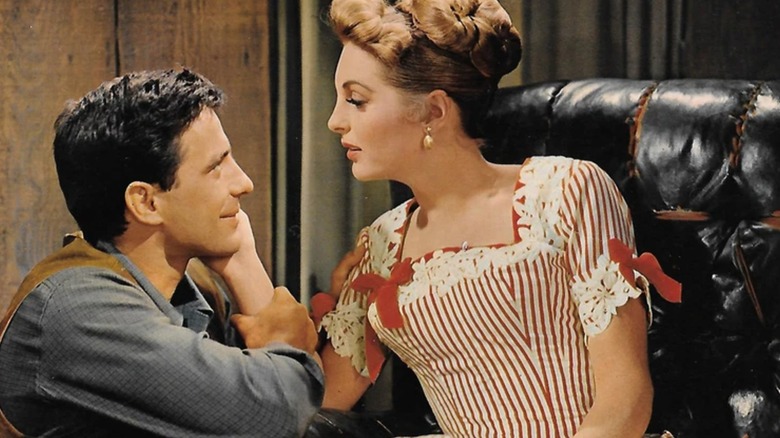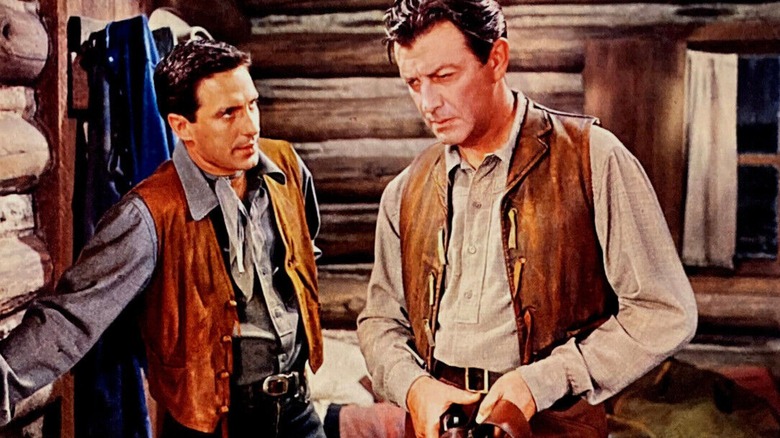The Twilight Zone Creator Rod Serling Wrote A Western Flop Featuring John Cassavetes
You might know Rod Serling as the host and creator of "The Twilight Zone," the acclaimed sci-fi anthology series that has become a blueprint for the genre since it first aired in 1959. Serling's involvement with the show can only be described as intimate, as he personally drew from his experience as a scriptwriter and chose to work with like-minded artists who understood sci-fi from the inside out. All 156 episodes of "The Twilight Zone" unfurl like a morality play with a twist ending, even though the themes range from staunch critiques of capitalism to personal ruminations about the loss of childhood innocence. There are also, of course, staple genre tropes thrown in for good measure, including prescient prophecies, time travel shenanigans, alien invasions, and the human-machine dichotomy. Each one of these distinct stories, however, culminates in the titular Twilight Zone, which emerges as a liminal space that defies human comprehension and pushes us toward uncomfortable truths.
Serling's talents as a scriptwriter who had an eye for nuance can be traced back to his early career efforts, which include the 1955 episode "Patterns," televised nationwide by Kraft Television Theatre. "Patterns" proved to be life-changing for Serling, as it put a spotlight on his ability to pen powerful narratives suited to the medium, the kind where thematic depth and entertainment appeal could exist side by side. "Patterns" is an engaging drama about complicated corporate power dynamics, and it promises a caliber of writing that the burgeoning television medium could benefit from at the time. And this did end up happening, as Serling was soon inundated with projects that were better because of his involvement, which also included several novels, plays, and radio scripts.
Serling also wrote screenplays for films, like he did for the 1958 Western, "Saddle the Wind," which stars Robert Taylor, Julie London, and John Cassavetes. Although this Robert Parrish-helmed film isn't a genre standout by any stretch of the imagination, it is a solid tale about two brothers who end up getting tangled in problems bigger than they had anticipated. Unfortunately, the film didn't do well at the box office and ended up costing MGM quite a bit of money ($308,000, to be exact).
Saddle the Wind is only exciting in bursts, and that's good enough
In "Saddle the Wind," retired gunman Steve Sinclair (Taylor) has put his gunslinger days behind him in more ways than one. Steve feels sickened by the very idea of violent bloodshed now and has chosen to spend the rest of his days as a rancher in a quaint community. This picture of idyllic bliss is shattered once his rowdy younger brother Tony (Cassavetes) drops by unannounced, bringing girlfriend Joan (London) with him, along with a whirlwind of trouble. What's worse, Tony is more trigger-happy than Steve would like him to be, as the former is seen strutting out to the front yard to show off his quick-draw skills. Thankfully, no one gets hurt this time.
The Steve-Tony dynamic is the beating heart of the film, as they're closely entangled despite their markedly different approach to life. Steve, who used to be a Confederate soldier, perceives every action through the lens of atonement, as he desperately wants to shed his past like snakeskin and embrace a quieter, softer philosophy. Tony's loud, violent machismo actively hinders this redemptive arc, bringing out impulses that Steve thought he had left behind in the past. When the bodies start dropping, it becomes clear that "Saddle the Wind" is about the compulsivity of evil, and our desperate efforts to pretend otherwise.
No matter how ruggedly empathetic Steve is towards his brother, Tony becomes the architect of his own destruction the moment he decides that he is justified in claiming lives and starts treating his six-shooter like a toy. It is too late before Tony realizes that he's not the only person wielding a gun, that there will always be other men like him who shoot first and ask questions later. This frenetic conflict isn't thematically consistent, but it is exciting enough to keep you on your toes. Serling injects genuine tension and pathos into this story, and you can feel these emotions linger even after the screen fades to black.

